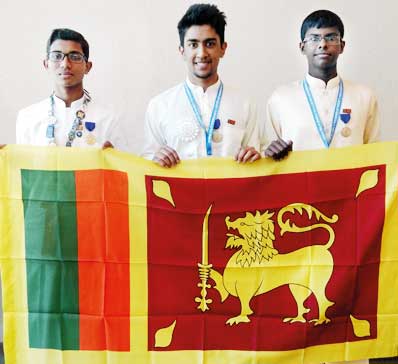Tuesday Feb 17, 2026
Tuesday Feb 17, 2026
Monday, 16 May 2016 01:34 - - {{hitsCtrl.values.hits}}
 By Hiyal Biyagamage in
By Hiyal Biyagamage in
Phoenix, Arizona
Team Sri Lanka succeeded with five awards at this year’s Intel International Science Engineering Fair (ISEF), the world’s largest high school science and research competition, which concluded in Phoenix, Arizona. Abishekh Gomes from Belvoir College International, Colombo won a grand award and two special awards while Chamindu Jayasanka from Hanwella Rajasinghe Central College and P.M. Lochana Piyumantha from Madampe Senanayake Central College clinched two special awards for their innovations.
Abishekh’s wearable device which converts American Sign Language (ASL) into English received a third place grand award of US$ 1000 in the Embedded Systems category at the Intel ISEF Grand Awards Ceremony. He also won a special award of US$ 2000 from Synaptics USA, the world-leading human interface solution developer which bases on touch, display and biometrics technologies, and US$ 500 from the Patent and Trademark Office Society of the United States. Chamindu’s ‘Modified and Adjustable Crutches’ won a special award of US$ 1000 from the Patent and Trademark Office Society of the United States for his outstanding originality and clarity in science and technology. The Nano technology-based solution for resistant Endometrial cancer cells from Lochana won another special award of US$ 1000 from Qatar Foundation for the excellence he has shown in human life sciences.
Speaking to Daily FT from Sri Lanka, Indika de Zoysa, Country Business Manager, Intel EM Ltd., Sri Lanka Liaison Office said, “Intel believes young people are key to future innovation and that in order to confront the global challenges of tomorrow, we need students from all backgrounds to get involved in science, technology, engineering and math. I hope this year’s achievements of Abishekh, Lochana and Chamindu will inspire other young people in Sri Lanka, to pursue their interest in these fields and apply their curiosity, creativity and ingenuity to the common good. I wish them the very best of luck in their future endeavours.
The 2016 Intel International Science and Engineering Fair featured more than 1,700 young scientists selected from 419 affiliate fairs in 77 countries, regions and territories. In addition to the top winners, approximately 600 finalists received awards and prizes for their innovative research, including 22 “Best of Category” winners, who each received a US$5,000 prize.
Han Jie Wang, 18, of Vancouver, Canada received the coveted first place Gordon E. Moore Award and US$75,000 for developing microbial fuel cells (MFCs) that more efficiently convert organic waste into electricity. Syamantak Payra, 15 from Texas, received one of two Intel Foundation Young Scientist Awards of US$50,000, for developing a low-cost electronically aided knee brace that allows an individual with a weakened leg to walk more naturally. Kathy Liu of Utah received the other Intel Foundation Young Scientist Award for developing an alternative battery component that could significantly improve battery performance and safety.
The Intel ISEF 2016 is funded jointly by Intel and the Intel Foundation with additional awards and support from dozens of other corporate, academic, governmental and science-focused organisations. This year, approximately US$4 million was awarded.